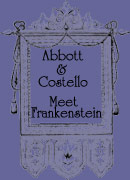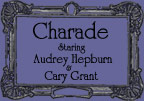 The Wolf Man: "In a half an hour the moon will rise, and I'll turn into a wolf!"
The Wolf Man: "In a half an hour the moon will rise, and I'll turn into a wolf!"
Costello: "You and 20 million other guys."
If the above quote brings a smile to your face, you'll like this picture, a flashback to the days when broadly-played comedy was fun for all ages, with nary a bodily fluid in sight.
In this outing, the dynamic duo meet up with Frankenstein's Monster (Glenn Strange), The Wolf Man (Lon Chaney Jr.), and Count Dracula- the latter played for the second and final time by Bela Lugosi, 17 years after the original "Dracula." Whatever moved him to reprise the role,
Lugosi shows that he could still slice ham with the best of 'em, as he manipulates a sinister female doctor into a brain replacement operation for Frankenstein's Monster. An operation which requires a simple, pliable brain, like- you guessed it- Costello's.
Opposing this villainy is Chaney's Lawrence Talbot, an odd but likeable chap who has the unfortunate habit of turning into a werewolf whenever the full moon shows itself. After a mixture of schtick and chills, the story winds up with a free-for-all in a creepy castle, complete with the sublimely silly sight of Dracula throwing a potted plant at The Wolf Man. The ending features a cameo by another classic Universal character, a direct lead-in to the next picture in what would become a series of "A. & C. Meet...." yukfests.
This movie is old-fashioned to be sure, and you may find yourself rolling your eyes at the corny gags and primitive special effects- but it's all such good-natured fun that you can't help being amused. On DVD, it looks better than it ever has, and you get a documentary to boot. And where else can you get an answer to the burning question "What's so scary that it makes Frankenstein's Monster recoil in fear?"

Audrey Hepburn: "I already know an awful lot of people and until one of them dies I couldn't possibly meet anyone else."
In a movie like this, you can bet that the above line will be prophetic. This is a romp through Hitchcock's field, starring one of Sir Alfred's leading men, but slanted a bit more towards the romantic side as you might expect from director Stanley "Singin' In The Rain" Donen.
The movie starts with a bang, as a murder seques into a nifty credit sequence animated by Maurice Binder (the man responsible for the titles on most of the James Bond films) and scored by Henry "The Pink Panther" Mancini. Then we meet Hepburn, who is immediately deglamorized via a gag involving a water pistol, and is considering a divorce from her husband due to her feeling that he is hiding something from her. It comes as no surprise that her instincts are correct, for hubby turns up dead, and several shady characters show up in a wickedly funny funeral scene- characters who are looking for some money owed to them by the deceased.
This bunch, which includes James Coburn and George Kennedy (who has a claw for a right hand), are convinced that Hepburn has the dough. A meeting with CIA man Walter Matthau fills in some of the blanks, but unfortunately for all concerned, Hepburn hasn't a clue as to the whereabouts of the missing $250,000 (a lot of money in 1964). She is menaced by the heavies, but she has an ally in the gallant form of Cary Grant, a man who has more in common with her late husband than she realizes.
Hepburn's heroine is firmly in the screwball comedy tradition- quirky, impulsive, and unabashed in her attraction to Grant, who has more important things (like the 250 grand) on his mind. The script gets some mileage out of their age difference- although Hepburn looks more mature here than in her "Funny Face" days, and Grant looks pretty darn good for a 60 year old, he was 25 years her senior (there's a Hollywood tradition for you).
Still, Grant is so charming, self-assured, and downright goofy (wait till you see how he cleans his suit) that we can believe the attraction. The obvious comparison here is to the superior "North By Northwest"- "Charade" is smaller in scope, but it hits the targets it's aiming for, and amidst the lighthearted goings-on there are some effective moments of suspense and horror. By the time the story has travelled its twisty path to a climax on the stage of a theatre, you feel that Hepburn and Grant's characters deserve a happy ending- whether they get it or not is up to the viewer to discover.
The DVD is up to Criterion's usual standards, and features an entertaining commentary by director Donen and writer Peter Stone.
Universal, 1964, 113 Mins. - Criterion DVD
![]()
|
|
||
|
© Melt Magazine 2001
|
||